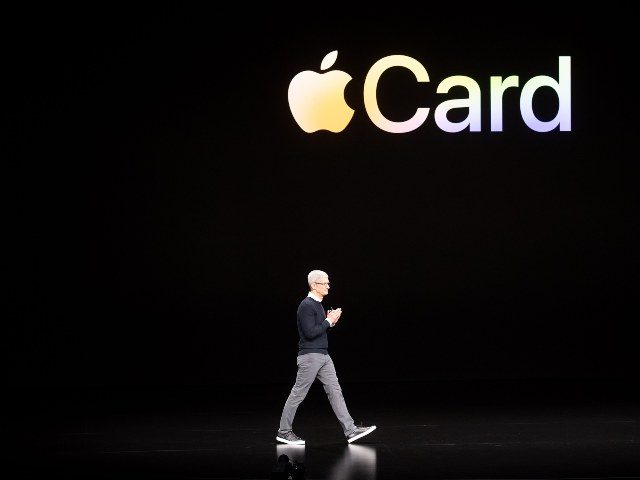Goldman Sachs will reportedly allow Apple Card customers to appeal their credit limits following recent allegations of discrimination based on gender.
Business Insider reports that Goldman Sachs has agreed to allow Apple Card customers to appeal their credit limits following recent backlash from customers alleging that female users were given lower credit limits than male users. Breitbart News recently reported that the issue started on Thursday after entrepreneur David Heinemeier Hansson claimed that the Apple Card gave him 20 times the credit limit his wife received. Apple co-founder Steve Wozniak has stated that his wife experienced similar results.
The Apple Card was launched in partnership with Goldman Sachs which has claimed that applicants were evaluated independently according to income and creditworthiness, with factors such as personal credit scores and personal debt taken into account. The bank stated that it was possible for two family members to receive very different credit decisions but added: “We have not, and will not, make decisions based on factors like gender.”
In reply to Hansson’s initial tweet about the issue, Wozniak stated that he had a similar experience and got 10 times more credit on the card compared with his wife. Wozniak stated: “We have no separate bank or credit card accounts or any separate assets. Hard to get to a human for a correction though. It’s big tech in 2019.”
Now, CEO of Goldman Sachs Bank USA Carey Halio has published a statement saying that users will be allowed to appeal their credit limit and reiterated that the company does not discrminated based on gender. “We hear you,” Halio wrote. “Your concerns are important to us and we take them seriously.”
The full statement from Halio reads:
We hear you. Your concerns are important to us and we take them seriously.
We have not and never will make decisions based on factors like gender. In fact, we do not know your gender or marital status during the Apple Card application process.
We are committed to ensuring our credit process is fair. Together with a third party, we reviewed our credit decisioning process to guard against unintended biases and outcomes.
Some of our customers have told us they received lower credit lines than they expected. In many cases, this is because their existing credit cards are supplemental cards under their spouse’s primary account — which may result in the applicant having limited personal credit history. Apple Card’s credit decision process is not aware of your marital status at the time of the application.
If you believe that your credit line does not adequately reflect your credit history because you may be in a similar situation, we want to hear from you. Based on additional information that we may request, we will re-evaluate your credit line.
Thank you for being an Apple Card customer.
Halio’s explanation provides greater insight into the issue than Sachs’ original explanation did; the issue of “supplemental cards” was not discussed initially.
Breitbart News financial editor John Carney wrote an article about this issue recently, stating that it was unlikely that Apple or Goldman Sachs were discriminating based on gender. Carney wrote:
I hate to be the one who tells you this but Apple and Goldman do not care about you. They do not care about your hopes, your dreams, your philosophy, your politics, or your gender. They’ll use whatever pronouns you ask them to.
We are all just future income streams to them. That’s it. Dollars divided by time. A discount rate, a probability of default, and a regulatory capital charge.
Neither company has a particular interest in rationing credit, apart from some attempt to estimate the maximum credit they can provide and still get paid back at an acceptable rate. They do not really care if you, as an individual, wind up paying them back. They just want to get paid back at a rate that means making short-term consumer loans is slightly profitable enough to cover their cost of capital.
They are constrained by regulations that penalize them for supplying what the government sees as too much credit to people whose lives might be ruined by over-indulgence in borrowing. Those include a myriad of rules from the Consumer Finance Protection Bureau, capital regulation from the FDIC and the Federal Reserve, and state laws on credit.
Think about it this way. If there were a team at Goldman Sachs who developed a computer program that gave too little credit to women, what are the odds that another team at Goldman wouldn’t have figured out how to make more money by providing the appropriate level of credit? Is everyone there too sexist to want to make money by lending appropriately to women customers?
Read the full article here.
Lucas Nolan is a reporter for Breitbart News covering issues of free speech and online censorship. Follow him on Twitter @LucasNolan or email him at lnolan@breitbart.com

COMMENTS
Please let us know if you're having issues with commenting.